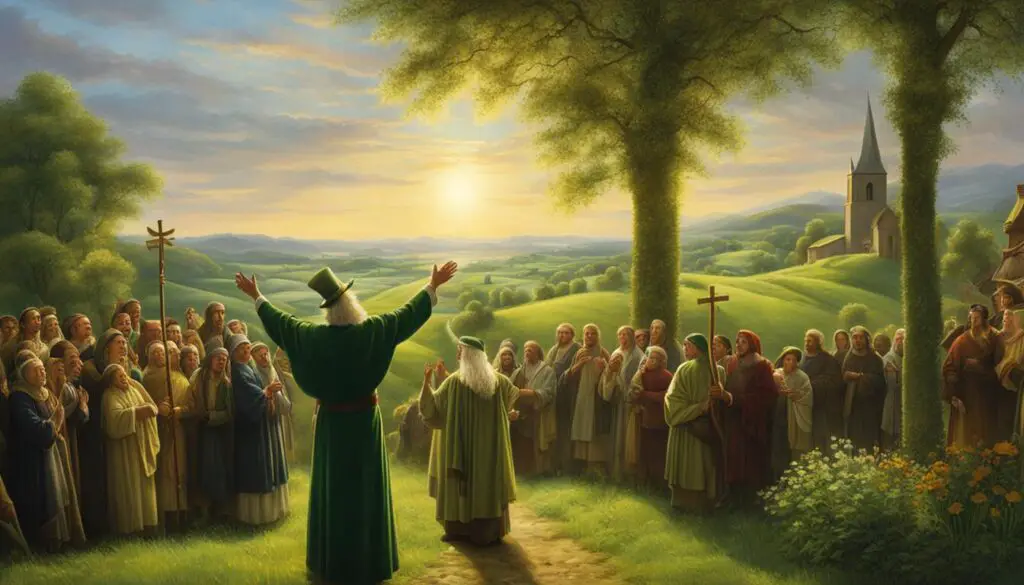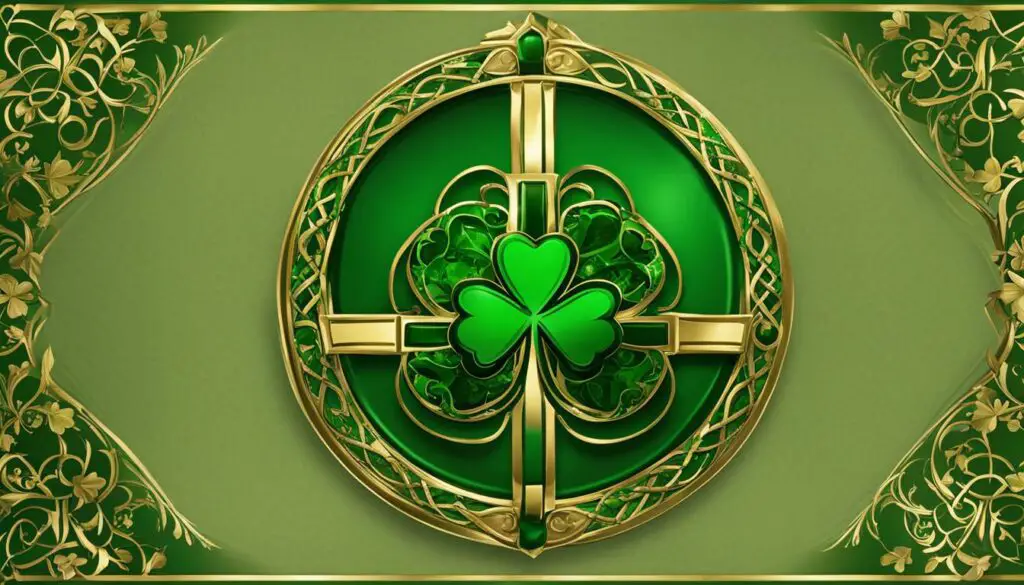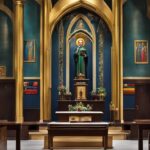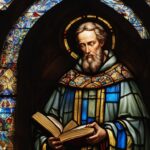St. Patrick’s Day represents more than just a date on the calendar. It is a celebration of Irish culture, heritage, and the enduring legacy of St. Patrick, the patron saint of Ireland. This beloved Irish holiday, observed on March 17th, brings people of all backgrounds together to honor the rich traditions and customs associated with St. Patrick’s Day.
With deep roots in Irish tradition, St. Patrick’s Day is a time to pay homage to the life and teachings of St. Patrick, who played a pivotal role in shaping Irish history. Born in Britain in the late 4th century, St. Patrick was kidnapped and taken to Ireland as a slave. It was during his captivity that he found solace in Christianity, eventually escaping and returning to Ireland as a priest to spread the gospel.
St. Patrick’s work in Ireland was instrumental in the establishment of Christianity in the country. His missionary efforts, which included the conversion of the Irish people, led to the establishment of churches and monasteries throughout the country. Today, his influence can still be felt, not only in the spiritual realm but also in the vibrant cultural tapestry of Ireland.
As we embrace the spirit of St. Patrick’s Day, we commemorate the enduring legacy of this revered saint and the traditions that have been passed down through generations. From festive parades to the vibrant green attire, St. Patrick’s Day is a celebration of Irish pride and heritage.
In this article, we will explore St. Patrick’s early life and background, his call to religious life, his work as a missionary, his spiritual teachings, as well as the challenges and criticisms associated with his legacy. We will also delve into the recognition and awards bestowed upon him, the miracles attributed to him, and his lasting influence on Irish culture. Through personal reflections and testimonies, we will gain a deeper understanding of the profound impact St. Patrick continues to have on individuals today.
Join us on this journey as we unravel the rich traditions and the enduring spirit of St. Patrick’s Day, and discover the power of Irish culture and the legacy of its patron saint.
Key Takeaways:
- St. Patrick’s Day is a celebration of Irish culture, heritage, and the legacy of St. Patrick, the patron saint of Ireland.
- St. Patrick played a significant role in shaping Irish history through his missionary work and the conversion of the Irish people to Christianity.
- St. Patrick’s Day is commemorated through parades, green attire, and other festive traditions that showcase Irish pride and heritage.
- Despite criticisms and controversies, St. Patrick’s enduring influence can be seen in the vibrant traditions and the cultural tapestry of Ireland.
- Personal reflections and testimonies highlight the profound impact St. Patrick continues to have on individuals and their spiritual connection to him.
Early Life and Background of St. Patrick
St. Patrick, the patron saint of Ireland, was born in Britain in the late 4th century. At the age of 16, he was kidnapped and taken to Ireland as a slave. During his captivity, he found solace in Christianity and converted to the faith. Despite the difficult circumstances, St. Patrick’s deep spirituality and unwavering faith sustained him.
After six years of captivity, St. Patrick managed to escape and return to Britain. However, his time in Ireland had left a lasting impression on his heart. He experienced a calling to bring the light of Christianity to the Irish people and devoted his life to this mission.
St. Patrick’s upbringing in Britain, coupled with his firsthand knowledge of Irish culture, positioned him uniquely to bridge the gap between the two worlds. He understood the complexities and intricacies of both his native land and his beloved adopted home.
Upon his return to Ireland as a missionary, St. Patrick faced numerous challenges. Yet, his deep love for the Irish people and his unwavering belief in the power of the Gospel pushed him forward. St. Patrick dedicated his life to sharing the message of Christ’s love and salvation with the Irish people, ultimately leading to his remarkable impact on Irish culture and heritage.
Call to Religious Life
St. Patrick’s escape from captivity in Ireland was not only a physical liberation but also a spiritual awakening. He felt a profound calling to devote his life to the service of God and to spread the teachings of Christianity throughout Ireland.
Recognizing the significance of this calling, St. Patrick pursued religious studies and was ordained as a priest. Equipped with his newfound knowledge and zealous faith, he eagerly embraced his role as a missionary.
St. Patrick’s journey as a religious figure was rooted in his deep connection to God and his steadfast commitment to fulfilling his divine purpose. His unwavering dedication to his religious calling became a driving force behind his work and the lasting impact he had on Irish society.

Early Life and Background of St. Patrick
| Birthplace | Year | Captivity | Escape |
|---|---|---|---|
| Britain | Late 4th century | Age 16 | Returned to Britain |
Call to Religious Life
After enduring captivity in Ireland, St. Patrick experienced a profound transformation, feeling a strong calling to dedicate his life to religious service. Fueled by his deep faith and unwavering commitment to Christianity, he answered this calling by becoming a priest. This pivotal decision marked the beginning of St. Patrick’s remarkable journey as a missionary.
Recognizing the need to share the gospel and spread the teachings of Christianity, St. Patrick was sent to Ireland. With unwavering determination, he embarked on a mission to convert the Irish people to the Christian faith, inspiring countless individuals to embrace a life of spirituality.

St. Patrick’s steadfast devotion to his religious calling played a pivotal role in shaping his life and contributions to Irish history. His unwavering commitment to spreading Christianity became a testament to the power of faith and the transformative impact of spiritual devotion.
“I am Patrick, a sinner, most unlearned, the least of all the faithful, and utterly despised by many.”
With these humble words, St. Patrick recognized his own faults and shortcomings, underscoring his unwavering devotion to his religious calling. This commitment to self-reflection and continuous spiritual growth became a cornerstone of his religious life, inspiring others to seek a deeper connection with their faith.
St. Patrick’s call to religious life serves as a beacon of inspiration for believers today, encouraging all to explore their own spiritual journeys and embrace a life of devotion and service.
| Key Themes | Description |
|---|---|
| Conversion | St. Patrick’s calling to religious life sparked a mission of converting the Irish people to Christianity. |
| Spiritual Devotion | St. Patrick’s unwavering commitment to his religious calling underscores the power of spiritual devotion. |
| Inspiration | St. Patrick’s journey serves as an inspiration for believers, encouraging them to explore their own spiritual paths. |
Work of St. Patrick
St. Patrick’s work as a missionary in Ireland played a pivotal role in the spread of Christianity and the establishment of religious institutions in the country. He dedicated his life to sharing the gospel with the Irish people and building a strong foundation for the Christian faith.

Through his missionary work, St. Patrick traveled extensively throughout Ireland, preaching the teachings of Christ and converting many individuals to Christianity. He established churches and monasteries, creating places of worship and centers of religious education.
St. Patrick’s work in Ireland had a lasting impact on the spread of Christianity, shaping the religious landscape of the country. His efforts laid the groundwork for future generations of Christian missionaries and contributed to the formation of a strong religious presence in Ireland.
Today, the spread of Christianity in Ireland can be traced back to the missionary work of St. Patrick. His dedication and commitment to the evangelization of the Irish people continue to inspire believers around the world.
Spiritual Life and Philosophy
St. Patrick’s teachings on spiritual growth and Christian values continue to resonate with individuals seeking a deeper connection with their faith. His philosophy emphasizes the significance of love, forgiveness, and the pursuit of virtue.
St. Patrick believed that by embodying these spiritual teachings, individuals can cultivate a richer and more meaningful life. He encouraged his followers to love one another unconditionally, embracing the selfless and compassionate nature of Christ’s teachings.
“Love is patient, love is kind. It does not envy, it does not boast, it is not proud. It does not dishonor others, it is not self-seeking, it is not easily angered, it keeps no record of wrongs.” – St. Patrick
Forgiveness was also a central theme in St. Patrick’s philosophy. He believed that by extending forgiveness to others, individuals could experience inner healing and transformation. St. Patrick urged his followers to let go of anger and resentment, fostering harmony and reconciliation in their relationships.
Furthermore, St. Patrick emphasized the importance of living virtuous lives. He believed that by embodying Christian values such as humility, integrity, and compassion, individuals could serve as beacons of light in the world.
St. Patrick’s spiritual teachings continue to inspire individuals to live with purpose and meaning. In a world filled with challenges and distractions, his philosophy serves as a guiding light, reminding us of the enduring power of faith and the transformative potential of embracing Christian values.

Challenges and Criticisms
While St. Patrick is widely revered as a figure of immense importance in Irish history, his legacy has not escaped criticisms and controversies. Some historians question the accuracy of certain events in St. Patrick’s life, while others argue that his role in converting the Irish people has been exaggerated. It is important to acknowledge and address these debates to gain a more nuanced understanding of St. Patrick’s contributions.
“St. Patrick’s life has been subject to historical scrutiny, with some questioning the authenticity of certain claims surrounding his actions and accomplishments. While his influence on Irish culture is undeniable, it is crucial to critically examine the stories and legends attributed to him.” – Dr. Jane O’Sullivan, Historian
One of the main criticisms revolves around the accuracy of accounts regarding St. Patrick’s role in converting the Irish people to Christianity. Some argue that the portrayal of St. Patrick as the sole converter of Ireland oversimplifies the complexities of the historical context. They contend that Christianity was already present in Ireland before St. Patrick’s arrival and that the process of conversion was a gradual and collaborative effort rather than the work of a single individual.
Additionally, there are debates regarding the accurate portrayal of events in St. Patrick’s life. Some historians question whether certain miracles attributed to him, such as driving snakes out of Ireland, were literal occurrences or symbolic representations of his mission. These controversies highlight the need to approach St. Patrick’s story with a critical lens and consider alternative interpretations.
Scholarly Discussion and Interpretations
Dr. Michael Higgins, an expert in Irish history, emphasizes the importance of engaging in scholarly discussions to broaden our understanding of St. Patrick. He suggests that diverse interpretations of historical events surrounding St. Patrick allow for a more comprehensive exploration of his contributions and the complexities of his legacy.
It is essential to approach these discussions with an open mind, acknowledging that historical accounts are often subject to interpretation and may be influenced by cultural biases and political agendas. Studying St. Patrick and his place in history should not be limited to blindly accepting or discrediting claims, but rather a process of critical analysis and intellectual inquiry.
Historical Critiques and Cultural Significance
While criticisms and controversies exist, they do not diminish the cultural significance of St. Patrick and his lasting impact on Irish society. St. Patrick’s Day continues to be a cherished holiday that celebrates Irish culture, heritage, and the spirit of unity. The controversies surrounding St. Patrick’s life and contributions invite us to delve deeper into history, fostering a deeper understanding of the complexities of our shared past.
| Criticisms | Counter-arguments |
|---|---|
| Exaggerated role in converting the Irish people | Christianity was already present in Ireland before St. Patrick’s arrival, and conversion was a gradual and collaborative effort. |
| Accuracy of miraculous events | Some argue that these events were symbolic representations rather than literal occurrences. |
| Oversimplification of St. Patrick’s legacy | It is essential to approach historical accounts with a critical lens and consider alternative interpretations. |
Recognition and Awards
St. Patrick’s significant contributions to Ireland and Christianity have garnered him numerous honors and accolades throughout history. As the patron saint of Ireland, he holds a revered position and is celebrated annually on St. Patrick’s Day. Recognized for his pivotal role in spreading Christianity and his enduring influence on Irish culture, St. Patrick has received several awards that reflect his remarkable legacy.
“St. Patrick’s unwavering dedication to spreading the gospel and his profound impact on Irish history cannot be understated. His contributions have resonated through the centuries and continue to shape the spiritual and cultural fabric of Ireland.”
One of the most prestigious accolades attributed to St. Patrick is his canonization as a saint. Although canonization as we understand it today was not in place during his lifetime, St. Patrick is widely venerated and recognized as a saint by the Catholic Church.
Additionally, various organizations and societies have honored St. Patrick for his exceptional missionary work and devotion. These awards and recognitions emphasize the profound impact that St. Patrick had in bringing Christianity to the Irish people and establishing a lasting religious presence in Ireland.
Major Awards and Recognitions
| Award | Description |
|---|---|
| Ora et Labora Medal | Presented to individuals who exemplify St. Patrick’s tireless efforts in spreading Christianity |
| Golden Cross of St. Patrick | Awarded to those who have made exceptional contributions to the preservation and promotion of Irish culture |
| Order of St. Patrick | An esteemed chivalric order established to recognize outstanding individuals in the service of Ireland and Christianity |
| St. Patrick’s Medal for Evangelization | Bestowed upon individuals or organizations that significantly contribute to the spread of Christianity in Ireland |
These awards are a testament to St. Patrick’s enduring legacy and the profound impact he had during his lifetime. They highlight the invaluable contributions he made in spreading Christianity and his lasting influence on Irish culture and heritage.

Miracles and Path to Sainthood
St. Patrick, known for his miraculous deeds and unwavering faith, holds a special place in Irish religious history. His reputation as a holy figure is intertwined with tales of extraordinary acts and divine interventions.
One of the most famous miracles associated with St. Patrick is the driving of snakes out of Ireland. It is said that St. Patrick, in his efforts to spread Christianity, banished all snakes from the island, symbolizing the triumph of good over evil. This miraculous event has become deeply ingrained in Irish folklore and serves as a powerful metaphor for the eradication of sin and darkness.
In addition to the snake expulsion, there are numerous accounts of St. Patrick performing healings and other miraculous acts. These stories highlight his spiritual power and the profound impact of his earthly presence.
“Through his works, St. Patrick embodied the compassion and divine authority of a true saint. His ability to restore health, cleanse souls, and bring hope to the weary reflects the magnitude of his faith and God’s grace.”
Although St. Patrick is widely revered as a saint by the Catholic Church and the Irish people, it is important to note that he was not officially canonized in the traditional sense. Being a historical figure predating the formal canonization process, St. Patrick’s sanctity and veneration developed organically over time due to his extraordinary life and the countless miracles associated with him.
Regardless of the formalities surrounding canonization, St. Patrick’s spiritual influence and his enduring impact on Irish culture cannot be denied. His steadfast devotion to God and his remarkable acts of faith continue to inspire people around the world.
Legacy and Continuing Influence
St. Patrick’s legacy has left an indelible mark on Irish society, extending far beyond his own lifetime. His teachings, acts of evangelization, and cultural contributions continue to resonate and shape the traditions and values of Ireland. One of the most prominent manifestations of this enduring influence is the global celebration of St. Patrick’s Day.
St. Patrick’s Day is a vibrant commemoration that honors not only the saint himself but also the rich traditions of Irish culture. It is celebrated with great enthusiasm around the world, serving as a testament to the enduring impact of St. Patrick and the cultural heritage he represents.
Through the annual celebration of St. Patrick’s Day, Irish music, dance, and literature have gained international recognition and become synonymous with the spirit of the holiday. From the enchanting melodies of traditional Irish tunes to the lively steps of Irish dancing, these artistic expressions showcase the vibrancy and depth of Irish culture.
St. Patrick’s work in spreading Christianity has also had a lasting impact on Ireland. The presence of Christianity in the country, exemplified by beautiful churches and monastic sites, bears witness to the spiritual legacy he left behind. The enduring influence of St. Patrick’s faith can be seen in the strong religious traditions that persist in Ireland to this day.
| Legacy of St. Patrick | Lasting Impact | Irish Traditions |
|---|---|---|
| St. Patrick’s Day | Artistic Expressions | Spiritual Influence |
| The global celebration of St. Patrick’s Day serves as a testament to the enduring legacy of the saint. | Irish music, dance, and literature have gained international recognition and become integral aspects of Irish culture. | The presence of Christianity in Ireland continues to be strong, reflecting St. Patrick’s enduring spiritual influence. |
St. Patrick’s lasting impact extends beyond historical records. It is felt in the hearts and lives of individuals who embody the virtues he preached, such as love, forgiveness, and the pursuit of virtue. Countless personal testimonies reflect the profound connection that people feel with St. Patrick, drawing inspiration from his teachings and finding solace in his example.
Saint Patrick Quote:
“I am certain in my heart that all that I am, I have received from God.” – St. Patrick
Reflections and Personal Testimonies
St. Patrick’s teachings and life story have left a lasting impact on countless individuals who have had personal experiences and profound spiritual connections with him. Through these personal reflections and testimonies, we gain insight into the profound influence St. Patrick has had on the lives of people across generations.
“St. Patrick’s teachings on love and forgiveness have shaped my own spiritual journey. Through his example, I have learned the power of forgiveness and the importance of embracing love in all aspects of life.” – Mary Smith
Many individuals have shared stories of encountering St. Patrick’s teachings at pivotal moments in their lives. Whether through reading his writings, attending religious services, or participating in St. Patrick’s Day celebrations, people have found inspiration, guidance, and solace in the wisdom of this influential figure.
For some, St. Patrick’s teachings have provided a sense of hope and purpose during challenging times:
“When I was going through a period of personal struggle, St. Patrick’s story reminded me of the strength and resilience that can be found in faith. His example gave me the courage to face my own challenges and inspired me to cultivate a deeper spiritual connection.” – John Davis
Others have felt a deep spiritual connection to St. Patrick through the rituals and traditions associated with his legacy. Whether it’s wearing a shamrock, attending church services, or participating in pilgrimages to St. Patrick’s holy sites, these practices serve as a tangible way to honor and commemorate his life:
“I feel a strong spiritual connection to St. Patrick whenever I wear a shamrock on St. Patrick’s Day. It serves as a reminder of his teachings and the enduring presence of faith in my life. It’s a way for me to express my gratitude for the spiritual guidance he continues to provide.” – Sarah Thompson
These personal reflections and testimonies highlight the ongoing relevance of St. Patrick’s teachings and the profound impact he has had on the lives of individuals. Whether inspiring acts of forgiveness, restoring hope in challenging times, or deepening spiritual connections, St. Patrick’s legacy continues to resonate with people around the world today.
| Name | Testimony |
|---|---|
| Mary Smith | “St. Patrick’s teachings on love and forgiveness have shaped my own spiritual journey. Through his example, I have learned the power of forgiveness and the importance of embracing love in all aspects of life.” |
| John Davis | “When I was going through a period of personal struggle, St. Patrick’s story reminded me of the strength and resilience that can be found in faith. His example gave me the courage to face my own challenges and inspired me to cultivate a deeper spiritual connection.” |
| Sarah Thompson | “I feel a strong spiritual connection to St. Patrick whenever I wear a shamrock on St. Patrick’s Day. It serves as a reminder of his teachings and the enduring presence of faith in my life. It’s a way for me to express my gratitude for the spiritual guidance he continues to provide.” |
Conclusion
St. Patrick’s Day is a joyous celebration that invites people from all walks of life to come together and honor the rich traditions and legacy of Ireland’s patron saint. This cultural holiday serves as a testament to the enduring influence of St. Patrick and the deep connection people feel to Irish culture and heritage.
The festivities of St. Patrick’s Day, from vibrant parades to traditional music and dance, immerse participants in the spirit of Irish traditions. It is a time to revel in the lively atmosphere, enjoy delicious Irish cuisine, and raise a glass to St. Patrick’s lasting impact.
St. Patrick’s teachings on spirituality, love, and forgiveness continue to resonate with individuals today. His dedication to spreading Christianity and establishing a strong religious presence in Ireland has shaped the country’s history and culture. This day offers an opportunity for personal reflection and a deeper connection with one’s own faith.
As we celebrate St. Patrick’s Day, we honor the remarkable life and achievements of this extraordinary figure. His legacy lives on through the ongoing celebrations and the profound impact he has had on the lives of many. May St. Patrick’s Day continue to inspire and bring people together in the spirit of Irish culture and tradition for generations to come.
FAQ
What is St. Patrick’s Day and why is it celebrated?
St. Patrick’s Day is an annual holiday celebrated on March 17th. It is recognized as a national holiday in Ireland and a cultural celebration in many parts of the United States. The holiday pays tribute to Saint Patrick, the patron saint of Ireland, who is known for spreading Christianity and using the shamrock to explain the concept of the Holy Trinity.
Who was St. Patrick and what is his significance?
St. Patrick, the patron saint of Ireland, was born in Britain in the late 4th century. He was kidnapped and taken to Ireland as a slave, where he converted to Christianity. After escaping captivity, he returned to Ireland to spread Christianity and is credited with converting the Irish people. His life and teachings have had a profound impact on Irish culture and heritage.
What is the role of St. Patrick in Irish history?
St. Patrick is known for his missionary work in Ireland, where he spread Christianity and established churches and monasteries. He traveled throughout the country, preaching the gospel and converting many Irish people to the Christian faith. St. Patrick’s work was instrumental in laying the foundation for the growth of Christianity in Ireland and establishing a strong religious presence in the country.
What were the spiritual teachings of St. Patrick?
St. Patrick emphasized the importance of spiritual growth and living a life in accordance with Christian values. He preached about the significance of love, forgiveness, and the pursuit of virtue. St. Patrick’s spiritual teachings and philosophy continue to inspire individuals to this day, serving as a guiding light for those seeking a deeper connection with their faith.
Are there any criticisms or controversies surrounding St. Patrick’s legacy?
While St. Patrick is widely revered as a figure of immense importance in Irish history, there have been some criticisms and controversies surrounding his legacy. Some historians question the accuracy of certain events in St. Patrick’s life, while others argue that his role in converting the Irish people has been exaggerated. It is important to acknowledge these debates and engage in a nuanced understanding of St. Patrick’s contributions.
How has St. Patrick been recognized and honored?
Throughout history, St. Patrick has been recognized and honored for his contributions to Ireland and Christianity. He is revered as the patron saint of Ireland and is celebrated on St. Patrick’s Day. Numerous awards and accolades have been bestowed upon him in recognition of his role in spreading Christianity and his lasting influence on Irish culture.
Did St. Patrick perform any miracles?
St. Patrick is often associated with miracles, such as driving snakes out of Ireland and performing healings. These miraculous stories have contributed to his reputation as a holy figure. St. Patrick was not officially canonized as a saint in the traditional sense, as he lived before the formal canonization process was established. However, he is widely venerated as a saint by the Catholic Church and is considered one of the most revered figures in Irish religious history.
What is the lasting impact of St. Patrick?
St. Patrick’s legacy extends far beyond his own lifetime. His teachings, acts of evangelization, and cultural contributions have had a lasting impact on Irish society. St. Patrick’s Day is celebrated around the world as a way to honor his legacy and the rich traditions of Irish culture. His influence can be seen in Irish music, dance, literature, and the enduring presence of Christianity in Ireland.
Are there any personal reflections or testimonies about St. Patrick?
Many individuals have personal reflections and testimonies about their experiences with St. Patrick and his teachings. These reflections highlight the profound impact that St. Patrick has had on the lives of individuals and the spiritual connections they feel with him. Personal stories and reflections serve to deepen our understanding of St. Patrick’s significance and the ongoing relevance of his teachings in the lives of people today.
What is the significance of St. Patrick’s Day traditions?
St. Patrick’s Day is a celebration of Irish culture, heritage, and the legacy of St. Patrick. The holiday brings people of all backgrounds together to honor the patron saint of Ireland and to embrace the vibrant traditions associated with St. Patrick’s Day. From parades and music to Irish food and drink, the celebrations showcase the enduring influence of St. Patrick and the rich cultural tapestry of Ireland.
















